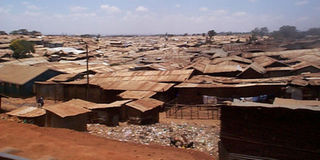Better living conditions in slums, Amnesty urges

Informal settlements at the sprawling Kibera slum. Amnesty International- Kenya has asked the Kenya Government to alleviate suffering and poor living conditions in Nairobi slums May 28, 2011. FILE
A human rights body has asked the Kenya Government to alleviate suffering and poor living conditions in Nairobi slums.
Amnesty International- Kenya has also accused the government of not doing enough to improve the lot of slum dwellers, especially women who bear the heaviest burden.
It also asked Kenya to adopt and implement national eviction guidelines in line with international human rights law and standards.
They cited: Kibera, Mathare, Mukuru kwa Njenga and Korogocho, as the four major slums in the city.
The organisation has also asked it to ensure that landlords in the slums are compelled to construct sanitation facilities for their tenants.
“The deprivation hits women and girls particularly hard as they need greater privacy than men when using toilets and washing themselves,” Country Director Justus Nyang’aya said Saturday.
Further, Amnesty has called for the putting up of police stations in slums that will effectively deal with security issues women in informal dwellings face.
Mr Nyang’aya said: “Violence against women is widespread and goes largely unpunished because of the ineffective policing in the area.”
Although they embraced the slum-upgrading spearheaded by the government, Mr Nyang’aya said more than the houses, more consideration should be put into the plan so that the people can still find means of making money other than sub-letting the houses.
“Their housing is inadequate and they have little access to clean water, sanitation, health care, schools and other essential public services and the reason this is so is that the Nairobi Master Plan does not have settlements in its plans and that is where more than half of Nairobi’s residents live,” Mr Nyang’aya said.
The organisation, which marked its 50th anniversary, will be running a three-day photo exhibition at Uhuru Park’s Freedom corner.
“Through the photos, we are telling government that our situation is bad, we pay tax and need proper habitation,” Mr Nyang’aya said.
The pictures taken of women and children in informal settlements in Nairobi depict the theme of the celebration- socio-economic and cultural rights.




